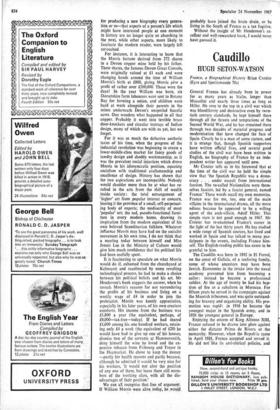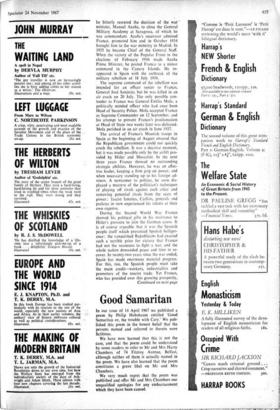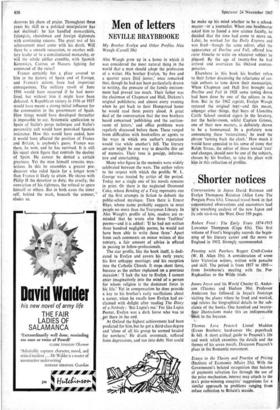Caudillo
HUGH SETON-WATSON
Franco, a Biographical History Brian Crozier (Eyre and Spottiswoode 70s)
General Franco has already been in power for as many years as Stalin, longer than Mussolini and nearly three times as long as Hitler. He rose to the top in a civil war which was bloodthirsty and destructive even by twen- tieth century standards, he kept himself there through all the threats and temptations of the Second World War, and he has remained there through two decades of material progress and modernisation that have changed the face of Spain. Clearly he is a man of some stature, and it is strange that, though Spanish supporters have written official lives, and several good studies of the civil war have been written in English, no biography of Franco by an inde- pendent writer has appeared until now.
Mr Crozier tells us in his foreword that at the time of the civil war he held the simple view that 'the Spanish Republic was a demo- cracy . . . under assault from international fascism. The so-called Nationalists were them- selves fascists, led by a fascist general, named Franco.' These words recall my own memories. Franco was for me, too, one of the main villains in the international drama, all the more odious because he appeared to be a willing agent of the arch-villain, Adolf Hitler. This simple view is not good enough in 1967. Mr Crozier has re-examined Franco's career in the light of the last thirty years. He has studied a wide range of Spanish sources, has lived and worked in Spain and has talked to many par- ticipants in the events, including Franco him- self. The English-reading public has cause to be grateful to him.
The Caudillo was born in 1892 in El Ferrol, on the coast of Galicia, of a seafaring family, some of whose ancestors may have been Jewish. Economies in the intake into the naval academy prevented him from becoming a sailor: instead he became a professional soldier. At the age of twenty he had his bap- tism of fire as a subaltern in Morocco. For fifteen years he served in the campaigns against the Moorish tribesmen, and was quite outstand- ing for bravery and organising ability. His pro- motion was rapid: in 1916 he became the youngest major in the Spanish army, and in 1926 the youngest general in Europe.
Enjoying the esteem of King Alfonso XIII, Franco refused to be drawn into plots against either the dictator Primo de Rivera or the monarchy. However, when the Republic came in April 1931, Franco accepted and served it. He did not like its anti-clerical policies, and
he bitterly resented the decision of the war ' minister, Manuel Azafia, to close the Gerieral Military Academy at Saragossa, of which he was commandant. Azafia's successor admired Franco, promoted him and in October 1934 brought him to the war ministry in Madrid. In 1935 he became Chief of the General Staff.
When the victory of the Popular Front in the elections of February 1936 made Azafia Prime Minister, he posted Franco to a minor command in the Canary Islands. He re- appeared in Spain with the outbreak of the military rebellion of 18 July 1936.
The supreme command of the rebellion was intended for an officer senior to Franco, General J05 Sanjurjo, but he was killed in an air crash on 20 July. The only possible con- tender to Franco was General Emilio Mola, a politically minded officer who had once been Head of Security Police. Mola accepted Franco as Supreme Commander on 12 September, and his attempt to prevent Franco's proclamation as Head of State two weeks later was defeated. Mola perished in an air crash in June 1937.
The arrival of Franco's Moorish troops in Spain at the beginning of August ensured that the Republican government could not quickly crush the rebellion. It was a decisive moment, but it was made possible only by the airlift pro- vided by Hitler and Mussolini. In the next three years Franco showed no outstanding strategic abilities. However, he was an effec- tive leader, keeping a firm grip on power, and when necessary standing up to his foreign ad- visers. A newcomer to politics, he soon dis- played a mastery of the politician's techniques of playing off rivals against each other and removing potential rivals from the seats of power: fascist fanatics, Carlists, generals and prelates in turn experienced his talents at their own expense.
During the Second World War Franco showed his political gifts in his resistance to Hitler's pressure to join the German cause. It is of course arguable that it was the Spanish people itself which prevented Spanish belliger- ence: the vanquished Republicans had exacted such a terrible price for victory that Franco had not the resources to fight a war, and the whole nation demanded peace and time to re- cover. In twenty-two years since the war ended, Spain has made enormous material progress. For this, too, the Spanish people must take the main credit—workers, industrialists and promoters of the tourist trade. Yet Franco, who has presided over this growing prosperity, Continued on next page
deserves his share of praise. Throughout these years his skill as a political manipulator has not declined: he has handled monarchists, filaagists, churchmen and foreign diplomats With continuing success. The great test of his achievement must come with his death. Will there be a smooth succession, to another mili- tary leader or to a constitutional monarchy, or will the whole edifice crumble, with Spanish Kerenskys, Castros or Nassers fighting for command of the ruins?
Franco certainly has a place assured to him in the history of Spain and of Europe; and Franco's actions have had important cOnsequences. The military revolt of June 1936 would have occurred if he had never lived, but without him it might have been defeated. A Republican victory in 1936 or 1937 would have meant a strong initial influence for the communists in the government of. Spain. How things would have developed thereafter is impossible to say. Systematic application to. Spain of Stalin's purge technique and Stalin's personality cult would have provoked Spanish resistance. How this would have ended, how it would have affected the position of France and Britain, is anybody's guess. Franco was there, he won, and he has survived. It is still his squat stern figure that controls the destiny of Spain. He cannot be denied a certain greatness. Yet the man himself remains mys- terious. In this he resembles a greater pre-n. decessor who ruled Spain for a longer term than Franco is likely to attain. He shares with Philip II the devotion to duty, the cruelty, the conviction of his rightness, the refusal to spare himself or others. But in both cases the inner self, behind the mask, beneath -the armour,' eludes us.
















































 Previous page
Previous page